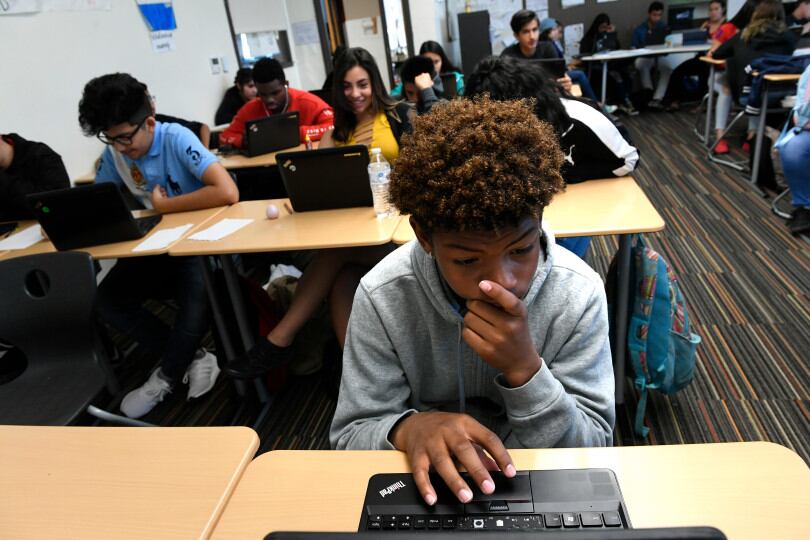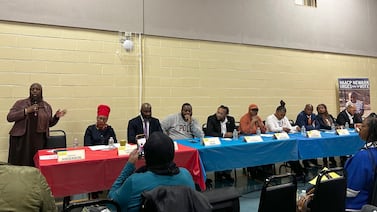More than a dozen Colorado school districts are asking local voters this year to pass tax measures that would pay for salary increases, enhanced security, and building upgrades.
Local tax requests from school districts often highlight inequities, as some districts — those with lots of property wealth or tax-friendly voters — often pass tax requests easily, while others have to try repeatedly to get a modest increase. The success or failure of a tax request can reflect a community’s trust in district leaders or their economic concerns.
According to the Colorado School Finance Project, which tracks school district tax requests, 19 school districts have a tax question on their local ballot this year. The majority are asking for either a bond or a mill levy override. Two districts are asking for both.
Both measures can affect property taxes, but there are different ways schools can use the money. Bond money is for one-time expenses, often capital projects or other infrastructure purchases, while mill levy money is more open and can be used for ongoing expenses such as salaries.
Among this year’s requests, the most common uses of tax measure money are to increase staff pay, hire more mental health or security professionals, boost career programming, and upgrade facilities.
Construction, architecture, and other development companies that stand to benefit from the money often bankroll campaigns urging voters to pass the measures.
Read more about what’s on the ballot for three school districts below:
Mapleton Issue 4A
4A $9 million mill levy override
What it means for property taxpayers: $64.85 per year, per $100,000 of home value
Largest Contribution: $5,000 from Sampson Construction
The Mapleton school district is asking for a mill levy override to cover a pay increase approved last year for teachers and other staff, the replacement of four school buildings, added career and technical programming for its high schools, and mental health and security upgrades.
The district’s updated salary agreement for teachers increased starting pay to $54,000 and honors more years for teachers coming in with experience from other districts. But as the plan works to attract and retain more educators, district officials say, it gets more expensive to fund because more teachers get to the higher end of the scale.
“There’s several things that would happen without this mill levy override,” said Mallory Boyce, a Mapleton school board member. “One is we would have to be cutting a lot of corners to meet our salary schedule.”
In addition, said Senior Deputy Superintendent Mike Crawford, while the district has several new buildings, there are still four that are more than 60 years old.
“It’s made for some interesting inequities that we’d like to address,” Crawford said.
The district applied for a state BEST grant for one of the four aging buildings, Meadow Community School Prek-8. The grants, funded in part by marijuana revenue, help districts pay for building upgrades. Mapleton’s project was listed as a backup. That means if one of the districts awarded a grant isn’t able to secure their matching portion or otherwise able to complete their project, Mapleton may receive its grant request.
The revenue from the tax measure would help Mapleton pay for its matching portion of the grant.
It’s not yet clear how the tax increase would contribute to more career education opportunities for students. Crawford said there would be community conversations about how the district might incorporate career pathways at the various high schools.
The district last passed a bond and a mill levy override in 2016.
27J School District Issue 5B
5B $17.74 million mill levy override
What it means for property taxpayers: $55.60 per year per $100,000 of home value
Largest contributions: $10,000 from LC Fulenwider; $10,000 from Clayton Properties Group Oakwood Homes; $10,000 from RBC Capital Markets
The 27J school district has only had voters approve a mill levy override once – in 2000. Since then, the district has tried seven times to ask voters for additional funds for school operations, but has not succeeded. Voters did narrowly approve a bond request last year to allow the district — one of just two in the metro area that is growing — to build new classrooms.
After failing to get mill levy overrides in the past, the district has cut funding to various programs, and moved to a four-day school week in an effort to recruit teachers.
Superintendent Chris Fiedler said he hopes the eighth time is the charm.
But this year, he’s clear that without the additional money, he is likely to cut school bus routes and some middle school sports.
Fiedler said the district needs about $6.5 million to increase salaries for teachers and other staff. Teacher starting salaries in 27J were raised recently to $43,077.
“Half the metro districts are at $50,000 and we’re seven grand behind that,” Fiedler said. “We’re in this dog fight for people to work with our kids.”
Dozens of staff have quit after having committed to working this school year, with some leaving after the start of the school year.
After failing to pass a tax measure many times before, Fiedler said he’s learned some lessons about what is important to his community. The ballot language, for example, explicitly states that “no revenue from this tax will be used for administration salary increases.”
In addition to increasing salaries, 27J’s tax increase would also pay for armed guards at elementary schools, something Fiedler said the community wanted in the wake of the Uvalde massacre. The money would also pay for additional staff and resources to expand career and technical education options at the high schools. The space for the career programming is already being built at the high schools with money approved in the bond last year.
Commerce City’s city council passed a tax cut in early October to help offset most of the increase that homeowners within the 27J boundaries would see if the district’s request is approved.
Douglas County Issues 5A and 5B
5A and 5B $60 million mill levy override and $450 million bond
What it means for property taxpayers: If both are approved, $52 per year, per $100,000 of home value
Largest contribution: $25,000 from developer Eric Garrett
In Douglas County, where the school district has been divided on many issues in recent years, board members unanimously agreed to put the tax measures on this year’s ballot.
The mill levy override would be used for teacher and staff pay increases, which have already been approved by the school board and would kick in if the measure is approved. The district has explored various pay systems for teachers and staff over the last decade, but this spring moved back to a traditional pay system that takes into account education level and years of experience.
Superintendent Erin Kane said the district’s pay still isn’t keeping up with nearby districts, and is affecting hiring and retention of staff. On average, teachers would get a 9% raise.
The bond measure would be used to make upgrades to school buildings, as well as to build three new schools in areas of the district that are growing, to expand career and technical programming, and to begin a long-term plan for potential school closures or mergers in areas that are seeing a decline in enrollment.
While the long-term planning will inform bond projects and building investments, it’s possible that some bond upgrades may occur at buildings that eventually have to close. Kane said that some upgrades can’t wait, and buildings are still a district asset that need to be maintained.
“That’s exactly why it’s important to be proactive and plan ahead,” Kane said. If a building is converted to another use such as a preschool or for other community services, “in any case the building would need to continue to heat and cool and be safe.”
If voters don’t approve the measures, Kane said she’ll be looking at how many voters support the measure anyway. She believes that with more time, she might get more voters on board to try again another year.
A committee raising money to support the Douglas County tax measures is under investigation by the state after complaints that the group may have accepted prohibited contributions, made improper contributions to candidates, and not used required disclosures on communications.
Yesenia Robles is a reporter for Chalkbeat Colorado covering K-12 school districts and multilingual education. Contact Yesenia at yrobles@chalkbeat.org.





